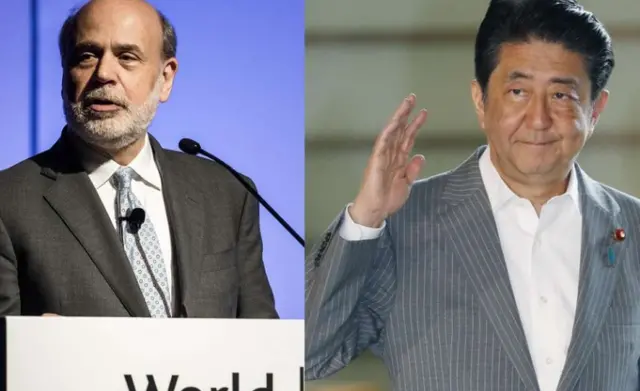Japanese Prime Minister Shinzo Abe on Tuesday told his economy minister to compile an economic stimulus package by the end of this month to revive a flagging economy in the face of sluggish private consumption and investment.
The order came as Abe met former US Federal Reserve Chairman Ben Bernanke to exchange views on the premier’s economic policy as he tries to revive his economic agenda after a big election victory in upper house elections on Sunday.
Shinzo Abe downplays poll win that could help remove bar on Japanese troops going to battle
Japan has a tradition of seeking the advice of overseas experts, something that’s been taken to a new level under Abe, who consulted with Nobel laureates Paul Krugman and Joseph Stiglitz prior to his decision in June to delay a sales-tax hike. Unlike with this week’s Bernanke visit, the meetings with Krugman and Stiglitz were well-publicised.
A Japanese government spokesman said Abe and Bernanke discussed what steps are necessary for Japan to end deflation and achieve sustainable economic growth. Bernanke did not respond to questions after the meeting.
Economy Minister Nobuteru Ishihara said on Tuesday the government will submit a supplementary budget to fund the stimulus to an extraordinary parliament session in the autumn.
Ishihara did not mention how much the government plans to spend, only saying he will start deliberations on the package’s size.
Japanese salarymen forced to tighten their belts further amid Abenomics’ failings
The government was ready to spend more than 10 trillion yen ($96.7 billion), ruling party sources told Reuters before Sunday’s election.
Abe swept to office in late 2012 with promises to revive Japan with his so-called “three arrows” of economic policy: aggressive quantitative easing, flexible fiscal spending and structural reforms.
The programme met with initial success as the Bank of Japan’s adoption of quantitative easing the following year initially raised inflation expectations and pushed down bond yields.
But after the initial awe faded, the country has flitted in and out of recession and disappointment with Abe’s structural reforms has caused many investors to lose hope in “Abenomics.” Some economists say Abe is returning to big fiscal spending to make up for the shortcomings of his reforms.
Some investors speculate that Japan might decide to provide “helicopter money” - a term coined by American economist Milton Friedman and cited by Bernanke before he became Fed chairman in 2006, when talking about how central banks might finance government budgets as a way to seek to fight deflation.
Japan’s Abenomics programme lies in tatters
Japan’s government spokesman said he was unaware of any talk of “helicopter money” at the meeting but Japan’s monetary policy was discussed.
Bernanke also visited the BOJ on Monday, where he is believed to have met Governor Haruhiko Kuroda.
Last week, government sources said Bernanke was expected to discuss Britain’s vote to leave the European Union and the BOJ’s negative interest rate policy with Abe and Kuroda.
A majority of Japanese continue to support Abe’s Cabinet after Sunday’s upper house election but are sceptical of the effectiveness of his economic policies, a Kyodo News survey showed Tuesday.
Diversity management key for a Japanese economy facing a dwindling working population
In a telephone survey conducted Monday and Tuesday, 56.4 per cent of respondents said they do not believe Abe’s economic policy mix can lift the country’s economy, while 32.0 per cent said they believe the measures would.
The support rate for Abe’s Cabinet stood at 53.0 per cent, while the disapproval rating was 34.7 per cent.
 简体中文
简体中文

